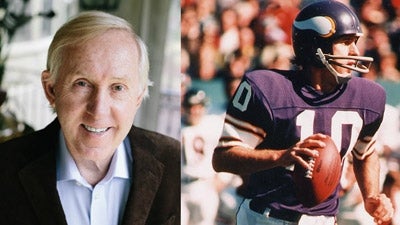
As a record-making quarterback for the Minnesota Vikings in the 1970s, I led my team to three Super Bowls in a span of only four years.
In case you hadn’t heard, I lost all three of them.
Only one other Hall of Fame quarterback can claim a “better” loss record, and that’s the great Jim Kelly of the Buffalo Bills, who was 0-4 to my 0-3.
Take Ownership of Your Loss
Now, there might be a host of reasons why any game is lost, but I still take responsibility for those three Super Bowl losses. If I just could’ve thrown another completion, thrown another touchdown pass, or scored more points than Pittsburgh or Miami or Oakland did, then we would have won. Sure, maybe it wasn’t entirely my fault, but I’ve taken ownership of that loss and made it my fault.
And since then, I’ve learned that there’s only one thing worse than failing. Failing doesn’t bother me. Making mistakes doesn’t bother me. What bothers me is when I don’t have the courage to take responsibility for it.
Think about this. Failure is success… if we learn from it. But first we have to recognize the failure. We all know people who simply can’t acknowledge being wrong. And when their mistake gets pointed out to them, they still run from it and go on the defensive.
In my case, I set all kinds of passing and rushing records, some of which stood for 17 years, but I also got some of the most sacks of any QB in my era and threw a whole lot of interceptions. But I didn’t blame the offensive tackle or complain that the receiver didn’t run the route better. Those interceptions belonged to me, and I had to face that and recognize it before I could learn from it.
Face Your Failure and Move On
During my NFL career, I started up my first venture, an educational support company called Learning Foundations — and it failed. I followed up with another big idea called Scramblers Village, which was fast food that had everything you could imagine on the menu. It was a bad idea — and it failed.
But I kept facing the failures and learning from them, which eventually led to a software venture that became a hugely profitable and successful partnership with IBM. How’s that for failure?
You should always take responsibility yourself for failure, even if it’s not your responsibility, even if it wasn’t your failure and other people contributed to it. When you take responsibility for the failure and you take ownership of that failure, then you have a chance to learn from it and not repeat it again. But when you don’t own it, well, that old cliche is true: bad news doesn’t get better with age. It becomes worse and worse, and then you never solve the problem.
Failure can be a learning mechanism, and it can also be the start of success. We are going to fail, we are going to lose, and we are going to make mistakes. That’s not the bad thing; the bad thing is not to recognize them, because if you don’t recognize failures you cannot learn from them.
Take ownership of your failure. That will drive you to deal with it, learn from it, and ultimately succeed because of it.
This article was originally published by Business Insider
If you like Fran’s articles and want to hear more, participate in his bi-monthly live Google Hangouts, discussing important business topics for entrepreneurs. To sign up for the Hangouts, join Fran’s team today at FranTarkenton.com!
Published: December 10, 2014
2623 Views
2623 Views











